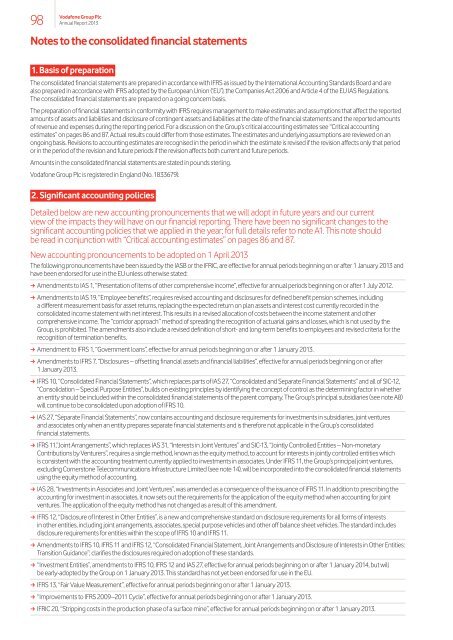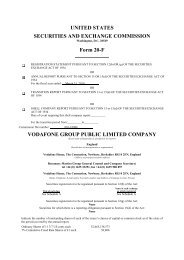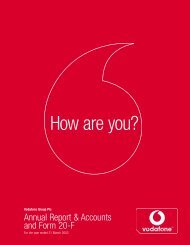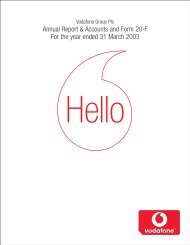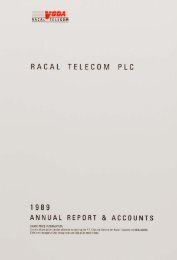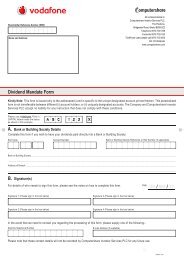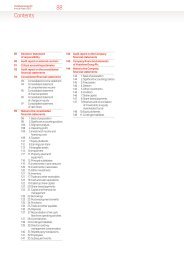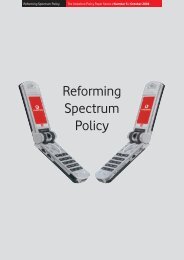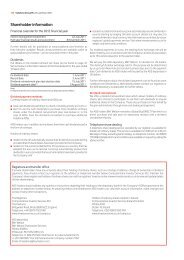The way ahead? - Vodafone
The way ahead? - Vodafone
The way ahead? - Vodafone
Create successful ePaper yourself
Turn your PDF publications into a flip-book with our unique Google optimized e-Paper software.
98<br />
<strong>Vodafone</strong> Group Plc<br />
Annual Report 2013<br />
Notes to the consolidated financial statements<br />
1. Basis of preparation<br />
<strong>The</strong> consolidated financial statements are prepared in accordance with IFRS as issued by the International Accounting Standards Board and are<br />
also prepared in accordance with IFRS adopted by the European Union (‘EU’), the Companies Act 2006 and Article 4 of the EU IAS Regulations.<br />
<strong>The</strong> consolidated financial statements are prepared on a going concern basis.<br />
<strong>The</strong> preparation of financial statements in conformity with IFRS requires management to make estimates and assumptions that affect the reported<br />
amounts of assets and liabilities and disclosure of contingent assets and liabilities at the date of the financial statements and the reported amounts<br />
of revenue and expenses during the reporting period. For a discussion on the Group’s critical accounting estimates see “Critical accounting<br />
estimates” on pages 86 and 87. Actual results could differ from those estimates. <strong>The</strong> estimates and underlying assumptions are reviewed on an<br />
ongoing basis. Revisions to accounting estimates are recognised in the period in which the estimate is revised if the revision affects only that period<br />
or in the period of the revision and future periods if the revision affects both current and future periods.<br />
Amounts in the consolidated financial statements are stated in pounds sterling.<br />
<strong>Vodafone</strong> Group Plc is registered in England (No. 1833679).<br />
2. Significant accounting policies<br />
Detailed below are new accounting pronouncements that we will adopt in future years and our current<br />
view of the impacts they will have on our financial reporting. <strong>The</strong>re have been no significant changes to the<br />
significant accounting policies that we applied in the year; for full details refer to note A1. This note should<br />
be read in conjunction with “Critical accounting estimates” on pages 86 and 87.<br />
New accounting pronouncements to be adopted on 1 April 2013<br />
<strong>The</strong> following pronouncements have been issued by the IASB or the IFRIC, are effective for annual periods beginning on or after 1 January 2013 and<br />
have been endorsed for use in the EU unless otherwise stated:<br />
a Amendments to IAS 1, “Presentation of items of other comprehensive income”, effective for annual periods beginning on or after 1 July 2012.<br />
a Amendments to IAS 19, “Employee benefits”, requires revised accounting and disclosures for defined benefit pension schemes, including<br />
a different measurement basis for asset returns, replacing the expected return on plan assets and interest cost currently recorded in the<br />
consolidated income statement with net interest. This results in a revised allocation of costs between the income statement and other<br />
comprehensive income. <strong>The</strong> “corridor approach” method of spreading the recognition of actuarial gains and losses, which is not used by the<br />
Group, is prohibited. <strong>The</strong> amendments also include a revised definition of short‑ and long‑term benefits to employees and revised criteria for the<br />
recognition of termination benefits.<br />
a Amendment to IFRS 1, “Government loans”, effective for annual periods beginning on or after 1 January 2013.<br />
a Amendments to IFRS 7, “Disclosures – offsetting financial assets and financial liabilities”, effective for annual periods beginning on or after<br />
1 January 2013.<br />
a IFRS 10, “Consolidated Financial Statements”, which replaces parts of IAS 27, “Consolidated and Separate Financial Statements” and all of SIC-12,<br />
“Consolidation – Special Purpose Entities”, builds on existing principles by identifying the concept of control as the determining factor in whether<br />
an entity should be included within the consolidated financial statements of the parent company. <strong>The</strong> Group’s principal subsidiaries (see note A8)<br />
will continue to be consolidated upon adoption of IFRS 10.<br />
a IAS 27, “Separate Financial Statements”, now contains accounting and disclosure requirements for investments in subsidiaries, joint ventures<br />
and associates only when an entity prepares separate financial statements and is therefore not applicable in the Group’s consolidated<br />
financial statements.<br />
a IFRS 11,”Joint Arrangements”, which replaces IAS 31, “Interests in Joint Ventures” and SIC‑13, “Jointly Controlled Entities – Non‑monetary<br />
Contributions by Venturers”, requires a single method, known as the equity method, to account for interests in jointly controlled entities which<br />
is consistent with the accounting treatment currently applied to investments in associates. Under IFRS 11, the Group’s principal joint ventures,<br />
excluding Cornerstone Telecommunications Infrastructure Limited (see note 14), will be incorporated into the consolidated financial statements<br />
using the equity method of accounting.<br />
a IAS 28, “Investments in Associates and Joint Ventures”, was amended as a consequence of the issuance of IFRS 11. In addition to prescribing the<br />
accounting for investment in associates, it now sets out the requirements for the application of the equity method when accounting for joint<br />
ventures. <strong>The</strong> application of the equity method has not changed as a result of this amendment.<br />
a IFRS 12, “Disclosure of Interest in Other Entities”, is a new and comprehensive standard on disclosure requirements for all forms of interests<br />
in other entities, including joint arrangements, associates, special purpose vehicles and other off balance sheet vehicles. <strong>The</strong> standard includes<br />
disclosure requirements for entities within the scope of IFRS 10 and IFRS 11.<br />
a Amendments to IFRS 10, IFRS 11 and IFRS 12, “Consolidated Financial Statement, Joint Arrangements and Disclosure of Interests in Other Entities:<br />
Transition Guidance”; clarifies the disclosures required on adoption of these standards.<br />
a “Investment Entities”, amendments to IFRS 10, IFRS 12 and IAS 27, effective for annual periods beginning on or after 1 January 2014, but will<br />
be early‑adopted by the Group on 1 January 2013. This standard has not yet been endorsed for use in the EU.<br />
a IFRS 13, “Fair Value Measurement”, effective for annual periods beginning on or after 1 January 2013.<br />
a “Improvements to IFRS 2009–2011 Cycle”, effective for annual periods beginning on or after 1 January 2013.<br />
a IFRIC 20, “Stripping costs in the production phase of a surface mine”, effective for annual periods beginning on or after 1 January 2013.


